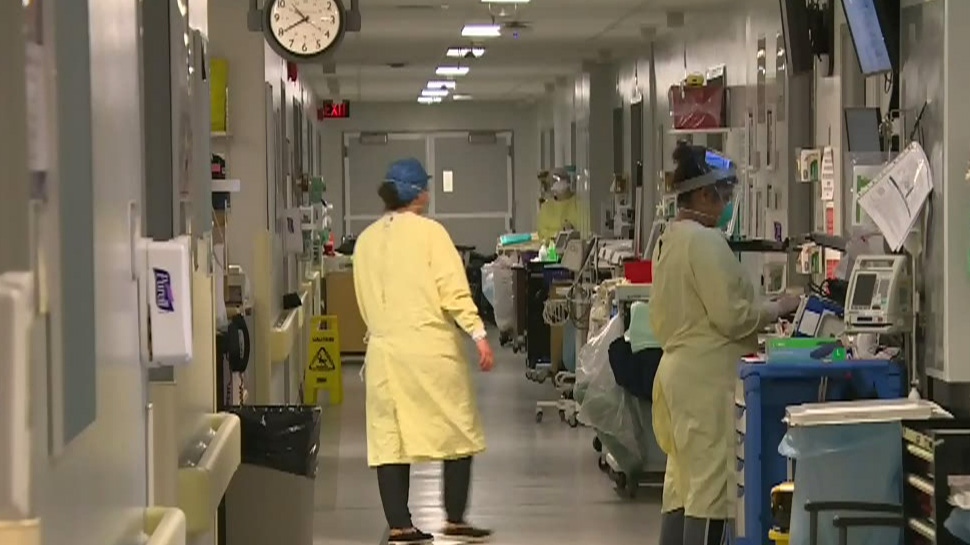Regulatory changes to ‘eliminate barriers’ in bringing international doctors to Manitoba: province
 A Manitoba hospital is pictured in an undated image. (Source: CTV Winnipeg)
A Manitoba hospital is pictured in an undated image. (Source: CTV Winnipeg)
Newly approved regulatory amendments will help internationally trained doctors work in the Manitoba health-care system sooner, the province announced Friday.
According to a news release, changes to the College of Physicians and Surgeons of Manitoba’s regulations remove the requirement for internationally educated physicians in specific membership classes to pass their Medical Council of Canada Qualifying Exam Part 1 (MCCQE1) before registering and practising in Manitoba.
Health Minister Audrey Gordon said the changes will streamline the path to help international physicians provide care sooner in the province.
"We are leaving no stone unturned to strengthen our health system for Manitobans," she said in the news release.
According to the province, internationally educated physicians who apply for provisional registration in Manitoba already have medical degrees and have completed residency programs with certifying exams. They say the MCCQE1 only assesses medical knowledge and the clinical decision-making ability of candidates at a level expected of a medical student.
"This change allows us to recruit more physicians to Manitoba while maintaining high competency levels. The exam was holding back many qualified, internationally trained physicians from coming to the province," said college registrar Dr. Anna Ziomek.
"From a regulatory standpoint, we must take all steps possible to eliminate barriers to assessment without compromising quality and patient safety."
Gordon said existing processes and policies will continue to support patient safety and care, including competence assessments and practice supervision requirements.
CTVNews.ca Top Stories

Fall sitting bookended by Liberal byelection losses ends with Trudeau government in tumult
The House of Commons adjourned on Tuesday, bringing an end to an unstable fall sitting that has been bookended by Liberal byelection losses. The conclusion of the fall sitting comes as Prime Minister Justin Trudeau's minority government is in turmoil.
2 B.C. police officers charged with sexual assault
Two officers with a Vancouver Island police department have been charged with the sexual assault of a "vulnerable" woman, authorities announced Tuesday.
Canadian government announces new border security plan amid Donald Trump tariff threats
The federal government has laid out a five-pillared approach to boosting border security, though it doesn't include specifics about where and how the $1.3-billion funding package earmarked in the fall economic statement will be allocated.
B.C. teacher disciplined for refusing to let student use bathroom
A teacher who refused to let a student use the bathroom in a B.C. school has been disciplined by the province's professional regulator.
Most Canadians have heard about Freeland's resignation from Trudeau cabinet, new poll finds
The majority of Canadians heard about Chrystia Freeland's surprise resignation from Prime Minister Justin Trudeau's cabinet, according to a new poll from Abacus Data released Tuesday.
Police chief says motive for Wisconsin school shooting was a 'combination of factors'
Investigators on Tuesday are focused on trying to determine a motive in a Wisconsin school shooting that left a teacher and a student dead and two other children in critical condition.
After investigating Jan. 6, House GOP sides with Trump and goes after Liz Cheney
Wrapping up their own investigation on the Jan. 6 2021 Capitol attack, House Republicans have concluded it's former GOP Rep. Liz Cheney who should be prosecuted for probing what happened when then-President Donald Trump sent his mob of supporters as Congress was certifying the 2020 election.
Wine may be good for the heart, new study says, but experts aren’t convinced
Drinking a small amount of wine each day may protect the heart, according to a new study of Spanish people following the plant-based Mediterranean diet, which typically includes drinking a small glass of wine with dinner.
The Canada Post strike is over, but it will take time to get back to normal, says spokesperson
Canada Post workers are back on the job after a gruelling four-week strike that halted deliveries across the country, but it could take time before operations are back to normal.


































